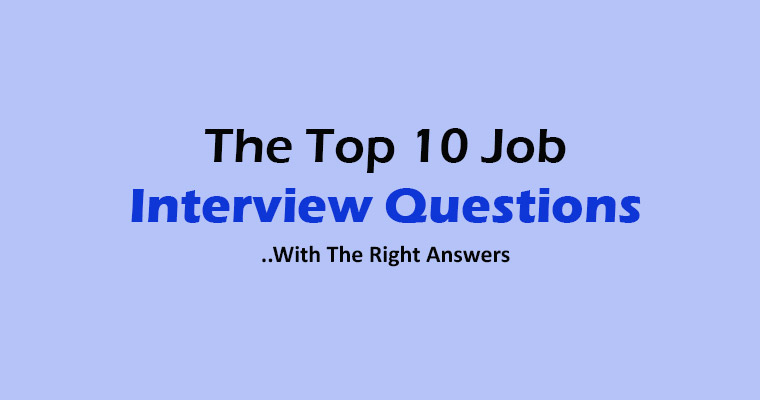Here’s a list of top 10 most common interview questions and answers. And also strategy on how to answer and crack a job interview.
1. What are your strengths?
This is your opportunity to offer yourself. Pick three or four of your qualities that are important to the activity and delineate them. For instance If you are meeting for an marketing job, say something like, “One of my strengths is persuasion. I am a sharp onlooker of individuals and quick to discern personalities.
2. How do you deal with conflict?
Each job, group and organization contains an element of conflict. The interviewer is exploring your approach to conflict with top ten interview questions like this. What resources do you use to oversee strife at work? How would you keep strife from heightening or incident once more?
3. Why should we hire you?
Answer this by summarizing your experiences: “With five years’ experience working in the marketing industry and my proven record of saving the company money, I could make a big difference in your company. I’m confident I would be a great addition to your team.”
4. What can you do for us that other candidates can’t?
Underline what makes you remarkable when you’re asked, “What would you be able to improve the situation us that different applicants can’t?”. This will take an appraisal of your encounters, aptitudes and characteristics. Outline compactly: “I have a unique combination of strong technical skills, and the ability to build strong customer relationships. This allows me to use my knowledge and break down information to be more user-friendly.”
5. What salary are you seeking?
It is to your advantage if the employer tells you the range first. Prepare by knowing the going rate in your area, and your bottom line or walk-away point. One possible answer would be: “I am sure when the time comes, we can agree on a reasonable amount. In what range do you typically pay someone with my background?”
6. What are three things your former manager would like you to improve on?
Try and remember your performance reviews, specify what they stated, and discuss the means you’ve taken to address those shortcomings.
7. Do you think it is important to be a team player?
- It is very important to be a good team player because it shows that you are willing to work with others.
- A good team player can resolve more difficult issues in a more efficient manner; especially when working with different departments within the company.
8. Why do you want to work here?
The interviewer is tuning in for an answer that shows you’ve thought about this and are not conveying resumes on the grounds that there is an opening. For instance, “I’ve chosen key organizations whose statements of purpose are in accordance with my qualities, where I know I could be excited about what the organization does, and this organization is high on my list of desirable choices.”
9. Why do you want to leave your current company?
The most ideal approach to handle this question is to state that you are searching for better opportunities. If you’ve been laid off, tell the truth, and clarify how you’ve been unfortunate. It is smarter to be completely honest and clarify your position than be found lying about your conditions.
10. What are your goals?
Sometimes it’s best to talk about short and intermediate goals rather than locking yourself into the distant future. For instance, “My quick objective is to land a position in a development arranged organization. My long term objective will rely upon where the organization goes. I want to eventually develop into a position of responsibility.”
